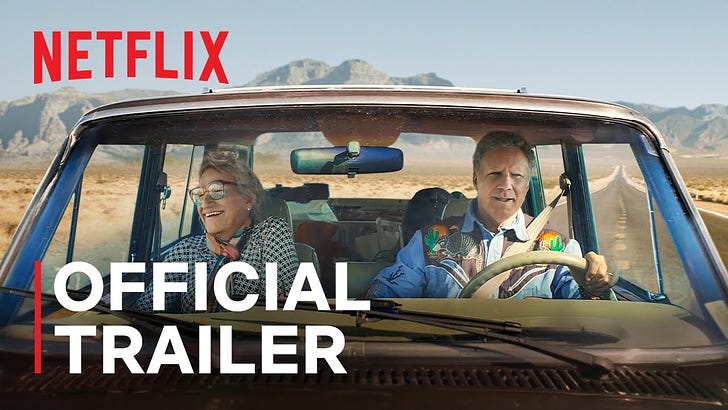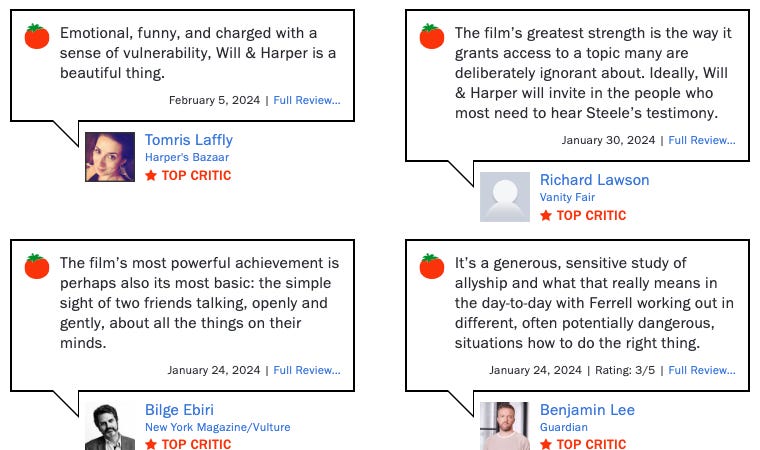Imagine if Will Ferrell’s Friend Were a Detransitioner
A new Netflix film highlights Hollywood’s narrow appreciation of underrepresented voices
Some Friday night in the near future the Netflix algorithm will urge you to check out a brand new Will Ferrell flick. But this time the megastar funny man isn’t playing a giant adorable elf or the beta dad opposite the ever-yoked Mark Wahlberg.
In Will & Harper, Ferrell plays a guy who embarks on a road trip with an old friend, one he recently learned is transgender, and one whom Ferrell hasn’t seen since the transition. But unlike Elf, Daddy’s Home, and the rest of Ferrell’s best-known work, Will & Harper isn’t fiction. It’s a real-life documentary about Ferrell and his friend Harper Steele.
Hollywood loves to elevate underrepresented voices and Steele’s is just the type of voice it’s eager to elevate.
Consider Ferrell.
His contribution to the film extends far beyond his on-screen presence. He’s a producer on the film and he participated in its recent press push as well as the January 22 premiere at the Sundance Film Festival. There audience members laughed, cried, and delivered not one but two standing ovations.
Critics have been equally smitten.
Will & Harper enjoys a 99% Tomatometer score. And with its buzztastic festival premiere, Netflix had to move fast. It took a “massive eight-figure deal” to snatch the film away from other suitors.
In a statement, the filmmaking team explained its hopes for Will & Harper: “It’s a movie about the power of friendship and acceptance that we hope can help shift the culture, and so we are excited to have a partner in Netflix that has the ability to reach the largest possible audience worldwide.”
Will & Harper has already conquered the biggest film festival, the biggest critics, and the biggest streamer. Don’t be surprised if eventually conquers the biggest awards shows too. Academy Award voters might not be able to resist its mix of celebrity and “teachable moment.”
The film seems poised to join other socially conscious Sundance films like Get Out, Fruitvale Station, RBG, and An Inconvenient Truth (which scored a triple standing-O in 2006) that jumped from the elite film festival into bigtime pop culture significance.
But if Will & Harper does rocket to mainstream success, it’s hard not to notice that the flourishing of this rather top-down cultural juggernaut hinges on a crucial detail, one that might make you ask, “Just how committed is Hollywood to elevating underrepresented voices?”
Imagine a film equal to Will & Harper in every way—production value, Will Ferrell’s support, and so on—but with one difference. What if, instead of being transgender, Will Ferrell’s friend were a detransitioner?
Our parallel universe film would not be purchased by Netflix. It would not receive 99% from Rotten Tomato critics. Forget the double standing-O, it would never reach Sundance audiences in the first place, nor would it be accepted by any film festival of note.
Ferrell’s agency (UTA) never would have backed it. Ferrell’s agent wouldn’t let him appear in the film let alone sign on as a producer. But that wouldn’t matter because Ferrell almost certainly wouldn’t have pursued the project in the first place.
But why not?
Detransitioners’ voices remain underrepresented, so shouldn’t the entertainment industry elevate them too?
Of course, the issue doesn’t have anything to do with transgenderism per se. The industry’s narrow worldview mutes all kinds of underrepresented voices.





